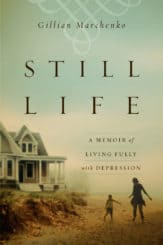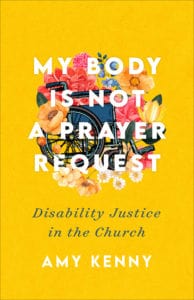
I drive out to the suburbs of Chicago for the trial. They administer a quick medical exam: blood pressure, urine sample, reflexes, nose, ears, deep breaths while a cold stethoscope pressed against my chest. I’m ushered into a tiny room with a small desk and two chairs and a sink in the corner, to complete yet another questionnaire.
A cheerful man with a salt and pepper beard goes down the list of questions. Trouble with sleep? Change in diet? Thoughts of worthlessness? Unable to get excited? Do you ever want to hurt yourself? Cloudy thinking? I answer the questions, smiling, jittery, and nodding throughout, mostly yesses.
I’m showered and in clean clothes. I haven’t looked this good in a while, I decide; combed hair lacquered with Big Sexy Hair Spray, mascara, shimmery lipstick. But I’m concerned. This is one of the few times I talk about my depression in the midst of an episode in the presence of someone other than my husband. Even while saying yes to all the questions, I attempt to act as if it is a social interaction with a long time friend. Why this need to perform? On the inside, I deem myself a failure. I can’t do anything right. But on the outside? I want people to see me and think I have what they call ‘it’ together.
“Mrs. Marchenko, our tests indicate you suffer from major depressive disorder. The numbers are low, some of the lowest I’ve seen. If the information is correct, you are extremely depressed.” I nod my head and offer another shaky smile, attempting understanding and confidence.
But inside, I start to break down and break apart. Major depressive disorder. Sounds ominous and final. Sounds like a real, honest-to-God mental illness. Is this what I wanted? Confirmation of a cracked up mind? A loss of life? The Gospel of Matthew, chapter sixteen, verse five comes to mind, “For whoever wants to save their life will lose it, but whoever loses their life for me will find it.” (Matt 16:5 NIV) Yeah, okay, but what about those of us who watch our lives drift away, and we do nothing about it? What if we no longer know who we lose our lives for? What if there seems to be no purpose or way to stop it?
What about those of us who watch our lives drift away, and we do nothing about it? What if we no longer know who we lose our lives for?
I reach my left hand up to my cheek and rub it for a second. I’m here, right? I’m still here. My toe starts to tap. The cheerful man’s lips transition from a smile to a straight line. He stares at me, his eyes attempt to pierce mine, but I don’t let them. I hold his stare but block the piercing. What does that say about me, that now, in this pivotal moment in my life, I still fake, or at least, try to fake my feelings?
It’s because I’ve disappeared already. At some point my body became a solid sheet of ice over a raging sea of emotions. The cold I put off caused people to look past me. They started to see through me. Or not see me at all. And now I am a master at pretending, that is, in front of anyone but Sergei, because I hate the fear, the guilt, the paranoia. Freezing meant a final attempt to hold on to myself and not disappear; stay cold and get through the day.
Freezing meant a final attempt to hold on to myself and not disappear; stay cold and get through the day.
But now, I hear the diagnosis. I sit in an uncomfortable chair in a bare, cream colored room. In one moment, my fingertips tingle. My feet begin to burn. I start to thaw.
No, I can’t thaw. No! I imagine myself start to crack and break apart inside. As kids, my mom took us ice skating. I don’t remember gliding across ice, but I remember my feet killing me afterward. Back at home my mom ordered me to undress. “Take off your socks, too. It’s best if you don’t have anything on your feet right now.” She set a bowl of tepid water in front of a chair. “Here. Sit. Put your toes in there.” I stuck my feet in the water and pain shot up my legs. My feet were on fire, burning, burning, burning in a bowl of warm water. “It hurts, Mom. Make it stop,” I cried.
Now, at the clinical trial, I watch myself thaw. Hold yourself together, Gillian. Stay cold. Don’t break.
I suppose that as with frozen toes after ice skating, one must be stripped bare to start to thaw. I thought I wanted this; a diagnosis, more information, help, but now I don’t know. I don’t want to bring feeling back to my limbs because I have no idea how to handle them. I want to scream It hurts. Make it stop. Instead, I stare past the cheerful man and smile.
“Why are you smiling? I told you that you test in the severe range of depression.” He waits for an answer.
“Um,” I clear my throat. “I don’t know why I’m smiling.” Sweat pours down my back in between my shoulder blades. The cheerful man, whom I assume is the psychiatrist but later find out conducts preliminary testing, looks at me with compassion. Cracks run up and down my body. Can he see them? I’m dripping. Is he glimpsing the real me?
The cheerful test taker’s face shows a pang of concern, and then poof, it’s gone. Cheery and smiley again, he speaks. “Wait in this room. The doctor will be in to see you in a moment.”
An hour later, assured I am a perfect candidate for the trial, I drive home in a fog, pulling my shirt up and wiping the wet make-up off my face at stop signs. At home, I change into yoga pants and a t-shirt with a stain on it, and crawl back into bed. I sleep for the next few hours until the rest of the family comes home from school and work.
Gillian Marchenko is an author, speaker, wife, and mother of four daughters. She writes and speaks about parenting kids with Down syndrome, faith, depression, imperfection and adoption. She served as an administrator for the Evangelical Free Church of American Special Needs Network, and is the author of Sun Shine Down and Still Life, from which this excerpt is used with permission of InterVarsity Press.
is an author, speaker, wife, and mother of four daughters. She writes and speaks about parenting kids with Down syndrome, faith, depression, imperfection and adoption. She served as an administrator for the Evangelical Free Church of American Special Needs Network, and is the author of Sun Shine Down and Still Life, from which this excerpt is used with permission of InterVarsity Press.


